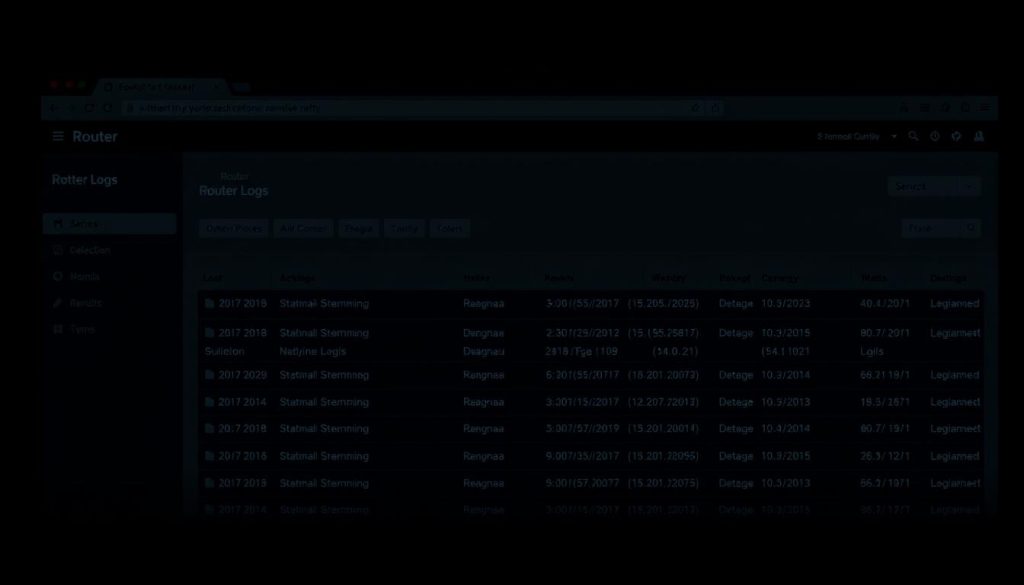When you connect your devices to the internet, you might wonder what info your router and Internet Service Provider (ISP) collect. Cybersecurity threats are increasing, and warnings from the FBI and tech giants like Google are sounding the alarm. They point to the dangers of smart devices connected to home networks.
Cybercriminals can use these devices to get to your sensitive info. Your router logs and ISP monitoring can show a lot about what you do online. This could put your privacy at risk.
Key Takeaways
- Router logs can store information about your online activities.
- ISP monitoring can track your internet usage.
- Cybersecurity threats are a growing concern for smart device users.
- You can take steps to protect your privacy and security online.
- Understanding router logs and ISP monitoring is crucial for maintaining your online security.
Understanding Router Logs
To keep your network safe, it’s key to know what your router logs say. These logs keep track of all network activities. They show who’s online, what devices are connected, and when they’re active.
What Are Router Logs?
Router logs are files on your router that record device connections, data sent, and active times. They help spot security risks, fix network problems, and watch user actions.
For example, if you have a Smart TV or streaming device on your network, logs can tell you what’s being streamed and who’s watching. This is great for keeping your Smart TV Security and Streaming Device Protection up to date.
Importance of Router Logs
Router logs are crucial because they offer a detailed look at your network’s activity. By checking these logs, you can find unauthorized access, malware, and fix network issues. They also help you see how you use your network, so you can make it better.
How Logs Can Help You
Router logs are very helpful. They can show you which devices use a lot of bandwidth, find odd activity, and check your network’s health. By looking at your logs often, you can keep your network safe and your devices secure.
| Log Information | Description | Benefits |
|---|---|---|
| User Activity | Records of devices connected and data transmitted | Helps identify potential security threats |
| Device Connections | Details of devices connected to the network | Assists in monitoring network usage |
| Connection Times | Records of when devices are active | Aids in troubleshooting connectivity issues |
By understanding and using your router logs, you can make your network safer, run better, and protect your devices from harm.
ISP Monitoring: An Overview
ISPs play a big role in watching your online activities. They manage networks and collect data. Knowing about ISP monitoring is key to protecting your online life.
What is ISP Monitoring?
ISP monitoring means Internet Service Providers keep an eye on what you do online. They track the sites you visit and how much data you use.
Key aspects of ISP monitoring include managing networks, collecting data for ads, and following the law.

Why ISPs Monitor Your Activity
ISPs watch your online actions for several reasons:
- Network management: To keep the network running smoothly and prevent slowdowns.
- Data collection: To get info for ads and market studies.
- Legal compliance: To follow laws and meet law enforcement needs.
This watching can lead to malicious software risks if the data isn’t kept safe.
Types of Data ISPs Can Access
ISPs can see a lot of your data, like:
| Data Type | Description |
|---|---|
| Browsing History | Records of the websites you visit. |
| Bandwidth Consumption | Details about your data usage patterns. |
| Device Information | Details about the devices connected to the internet through your ISP. |
Recent cases show how important it is to know what data ISPs can see and how they use it.
What Information is Stored in Router Logs?
Router logs are more than just simple records. They hold detailed data on user activity, device connections, and how long these connections last. This info is key for keeping your network safe and can help fight off malware and other cyber threats, including those aimed at your Smart TV.
User Activity
Your router logs track what websites you visit, apps you use, and when you’re online. This helps you understand your internet habits and spot potential security risks. For example, if you see odd activity, it might mean your Smart TV has malware, like Smart TV Malware, and you need to act fast.

Device Connections
Your router logs also record all devices on your network. This includes computers, phones, smart home gadgets, and your Smart TV. Knowing which devices are connected and when can help you catch unauthorized access to your network. Here are some important points to remember:
- Spot unknown devices on your network.
- Keep an eye on your devices’ connection status to make sure they’re safe.
- Use this info to set up your network for better security.
Connection Times and Durations
The logs also track when devices join and leave your network, along with how long they stay. This info is crucial for fixing network problems and making your internet plan better. For example, if your devices keep disconnecting, it might show a router or internet service provider issue.
By looking at connection times and lengths, you can also make your network stronger. Spotting unusual patterns or long periods of inactivity can help you set up stronger defenses against cyber threats.
Data Privacy and Security Implications
The data your router and ISP collect is crucial for your online safety and privacy. It’s key to grasp these points to shield yourself from new cyber dangers.
Risks Associated with Router Logs
Router logs show a lot about your online life, like what devices you use and when. This info can be at risk if not kept safe from cybersecurity threats.
Some dangers of router logs include:
- Unauthorized access to your network
- Data breaches that expose your personal information
- Targeted advertising based on your browsing habits

Impact of ISP Monitoring on Privacy
ISP monitoring can greatly affect your privacy. They track your online actions, creating detailed profiles of your browsing. They then sell this data to others.
| ISP Monitoring Activity | Potential Impact |
|---|---|
| Tracking browsing history | Targeted advertising, data profiling |
| Monitoring data usage | Throttling internet speeds, additional fees |
| Selling data to third parties | Loss of privacy, potential data breaches |
Legal Considerations
There are laws about how routers and ISPs handle your data. Knowing these laws helps protect your rights and privacy online.
Important legal points include:
- Data protection laws that control personal data collection and use
- Privacy laws that let you control your personal info
- Rules that make ISPs keep your data safe
By knowing these laws and securing your online actions, you can fight off cybersecurity threats and keep your privacy.
How to Access Your Router Logs
Checking your router logs is key to keeping your network safe. It helps you see what devices are connected and spot security risks. This includes threats like malware and spyware on Smart TVs and streaming devices.
Steps to Log into Your Router
To see your router logs, first log into your router. Here’s how:
- Open a web browser and type your router’s IP address. Common ones are 192.168.0.1 or 192.168.1.1.
- Use your router’s admin username and password. You can find these on the router or in its manual.
- Go to the “Logs,” “Advanced,” or “Administration” section to find the logs.

Navigating Router Settings
After logging in, find the logs in your router’s settings. The steps might differ based on your router. But, you’re looking for logging or monitoring sections. Some routers show detailed logs on device connections, data, and website visits.
Below is a table to guide you on what router logs show and why they matter for Smart TV security:
| Log Information | Description | Significance |
|---|---|---|
| Device Connections | Lists devices connected to your network. | Helps spot unauthorized devices. |
| Data Transfer | Shows data transferred by devices. | Indicates if a device might be infected. |
| Visited Websites | Logs websites visited by network devices. | Helps monitor and control internet use. |
By regularly reviewing your router logs, you boost your network’s security. This protects your devices, like Smart TVs and streaming devices, from threats.
What Can Your ISP See?
What your ISP can see about your online activities might surprise you. As you browse the internet, they can see many things. This can put you at risk of Malicious Software Risks if not managed well.
Websites Visited
Your ISP can see the websites you visit. They know the URLs, how long you stay, and how often you go back. This can be a concern for those who value their privacy, especially when using devices that need Streaming Device Protection.
Data Usage Statistics
ISPs also track your data usage. They see how much data you upload and download. This tells them about your online habits, like streaming or file downloads. Knowing your data usage helps you manage your internet plan and avoid overspending.
Bandwidth Consumption
ISPs also watch your bandwidth consumption. This is how much bandwidth your internet uses at any time. High usage can slow down your internet, especially with many devices connected. It’s important to manage bandwidth to keep your online experience smooth.
In summary, your ISP can see a lot about your online activities. They know the websites you visit, your data usage, and bandwidth consumption. Knowing this helps you protect your privacy and security online. You can use tools to enhance your privacy and security.
Keeping Your Router Logs Safe
To keep your network safe, it’s key to protect your router logs. These logs hold important info about your network use. Keeping them safe is vital to fight off cyber threats.
Importance of Secure Access
Having secure access to your router logs is crucial. It stops hackers from learning about your network’s weak spots. By controlling who sees these logs, you make your network stronger against attacks. Recent events have shown that hacked router logs can cause big security problems, making strong access controls even more important.
To secure access, you should:
- Change the default admin password to a strong, unique password.
- Enable two-factor authentication if your router supports it.
- Limit access to the router’s admin interface to specific IP addresses.
Regular Maintenance and Updates
Keeping your router logs safe also means regular upkeep. This includes updating your router’s firmware to fix security holes. Also, make sure your log management is current. By keeping up with security updates, you can shield your network from new threats.
Some key maintenance tasks include:
| Task | Description | Frequency |
|---|---|---|
| Firmware Updates | Update your router’s firmware to the latest version. | Monthly |
| Log Review | Regularly review your router logs for suspicious activity. | Weekly |
| Password Changes | Change your router’s admin password. | Quarterly |
By doing these tasks and keeping up with recent cases of router log breaches, you can greatly improve your network’s security. This way, you can keep your router logs safe.
Tools for Increased Online Privacy
There are many tools to boost your online privacy. As you explore the digital world, keeping your personal info safe is key. Two top tools are Virtual Private Networks (VPNs) and firewalls.
VPNs and Their Benefits
A VPN encrypts your internet, making it hard for others to see your data. It’s great for keeping hackers away, especially on public Wi-Fi. VPNs are especially good for streaming devices, defending against malware and threats.
VPNs offer several benefits:
- Encryption of your internet traffic
- Masking of your IP address
- Protection against data theft
- Access to geo-restricted content
When picking a VPN, look at their logging policy, server locations, and support.
Using Firewalls to Enhance Security
A firewall checks and controls network traffic. It can be hardware, software, or both. Setting up your firewall right can greatly boost your device’s security and block unwanted access.
Here’s a comparison of VPNs and firewalls:
| Feature | VPNs | Firewalls |
|---|---|---|
| Primary Function | Encrypts internet traffic | Controls network traffic |
| Security Benefits | Protects against data interception | Blocks unauthorized access |
| Use Cases | Secure browsing, streaming | Network security, device protection |
For Smart TV Malware Defense and Streaming Device Security Measures, using VPNs and firewalls together is best. Knowing and using these tools can greatly improve your online privacy and security.
Managing Your Online Presence
When you’re online, it’s key to control your presence to avoid cybersecurity threats. You need to take a few important steps to keep your online life safe and private.
Customizing Privacy Settings
Start by tweaking your privacy settings on devices and accounts. This means changing settings on social media, email, and even your Smart TV. You want to share less personal info with the world or third parties.
For example, tweaking your social media privacy can control who sees your stuff. Also, setting up your smart TV’s privacy can keep your viewing habits safe from prying eyes.
Anonymizing Your Internet Activity
Another big step is to make your online activity anonymous. Tools like Virtual Private Networks (VPNs) can hide your IP address. This makes it hard for others to track you, especially on public Wi-Fi.
Also, think about what you share online and use extensions to block tracking cookies. These actions help keep your internet use private. By doing this, you lower the chance of falling into cybersecurity threats and keep your online identity safe.
Best Practices for Router Management
To keep your network safe, it’s key to manage your router well. Good router management means doing several important things. These actions help protect your smart TVs and streaming devices from malware and spyware.
One important step is to check your router logs often. Router logs show you what’s happening on your network. They help you spot any security threats.
Regularly Check Your Logs
Looking at your router logs regularly can spot unusual activity. This might mean there’s a security problem. To do this, log into your router’s settings and find the logs section. Look for any devices or activities that seem off.
Here is a simple table to help you understand what to look for in your router logs:
| Log Entry | Description | Action |
|---|---|---|
| Unknown Device Connected | A device not recognized by you is connected to your network. | Investigate the device and remove it if necessary. |
| Suspicious Activity | Unusual activity that could indicate malware or spyware. | Run a virus scan and check for software updates. |
| Failed Login Attempts | Multiple failed attempts to log into your router. | Change your router’s password and limit login attempts. |
Conducting Speed Tests
Doing regular speed tests is also a good practice. Speed tests show how well your network is working. They help find any problems that might slow down your internet.
By following these practices, you can make your network safer and faster. Checking your logs and doing speed tests are easy ways to fight malware and spyware. They help keep your network safe.
Conclusion: Staying Informed and Secure
Learning about router logs and ISP monitoring is key to keeping your online life safe. Recent cases highlight the importance of staying informed to avoid cyber threats.
Key Takeaways
Router logs track your online actions, and ISPs watch your internet use. Knowing this lets you protect your digital world.
Protecting Your Privacy
To stay safe, check your router logs often, use VPNs, and adjust your privacy settings. These steps help lower your risk of cyber attacks.
Being informed and proactive is vital in today’s digital world. It keeps your online life private and secure.

